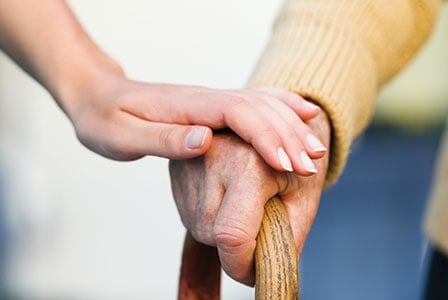
Cancer patients often feel a loss of control over their health. Thankfully, nutrition, exercise, emotional support, and integrative care all help patients cope.
The word “cancer” is fraught with emotion—mostly negative. Receiving a diagnosis of cancer is overwhelming; it can leave patients feeling a loss of control over their health—and their lives. How does one manage the physical and emotional components of a cancer diagnosis?
Taking control
Tamara Lee had been going for routine Pap smears for years without any cause for concern—until one day in 2008, when she got the kind of news no one ever wants to hear. The mother of two was diagnosed with cervical cancer and ended up having surgery and radiation soon after.
“I was absolutely shocked,” Lee says. “I didn’t have any symptoms; I was feeling totally fine. It hit me really hard.”
As Lee can attest, navigating a cancer diagnosis can be overwhelming. Treatment usually happens quickly. Aside from dealing with the physical effects of the disease itself and conventional treatments such as chemotherapy, people may have to adjust their lifestyle, with changes to their diet, supplement, and exercise regimens.
Then there’s the emotional impact. A diagnosis can trigger deep inner turmoil. Many people find they need support and healing for their mind and soul as much as for their body.
“There are a number of emotional reactions that a person may go through, including shock, fear, and anxiety,” says Sarah Young, program and outreach coordinator at the Ottawa Integrative Cancer Centre. “One’s life is suddenly shifted dramatically; people are derailed in their path.
“Even if it’s a stage 1 or stage 2, the word ‘cancer’ has so much associated with it,” she adds. “People can also feel quite alienated and powerless.”
However, there are steps people can take to feel more in control of what some call the “cancer journey.” Making healthy lifestyle changes is one. So is seeking integrated care. Using evidence-based, effective complementary therapies to support people as they undergo conventional cancer treatment, this model of care is holistic and patient-centred and aims to give people a sense of empowerment.
“The way in which our health care system is set up, people go through conventional treatments in a very passive way,” Young says. “They’re informed that they may need radiation or this much chemotherapy or surgery and they’re not in control at all.
“What’s crucial to know is that, in fact, there are many ways they can improve their health and well-being. There’s a lot they can do to improve their quality of life and to extend their life.”
Eating foods that heal
Diet plays a huge role in overall well-being, and healthy changes can be especially helpful when someone is going through cancer. Medical cancer treatments are all about killing cancer cells, but in the process healthy cells are damaged as well. That’s why good nutrition is so important.
Variety
Eating a variety of the right kinds of foods before, during, and after treatment can boost energy, strength, mood, and immunity. It can also help you maintain weight, lower the risk of infection, better tolerate side effects from treatment, and diminish recovery and healing time.
Special requirements
However, the illness itself and its treatments can affect the body’s ability to tolerate certain foods and use nutrients. Sometimes people need to consume a high-calorie diet in order to keep their weight up. Cancer can also affect people’s appetite and capacity to eat. Nausea, mouth sores, gum problems, depression, and fatigue can all make eating difficult or uncomfortable. In some cases, people need to consume soft, cool foods such as smoothies or milkshakes.
Consuming easy-to-digest foods is helpful, and getting sufficient nutrients is vital. During and after cancer treatment, a wholesome diet low in fat and red meat and high in fibre and plant-based foods is beneficial in getting well and staying well.
Anticancer diet
Many people adopt an anticancer diet, which includes foods that are proven to help ward off the disease, including garlic; cruciferous vegetables such as broccoli, cauliflower, and cabbage; tomatoes; spinach; and blueberries, among others.
Nutritional guidance
“Most people would agree that proper nutrition plays a very important role in our health, but when it comes down to a practical level, it can be quite challenging,” says Judy Tang, medical doctor at BC’s InspireHealth. Members there spend an hour with a nutritionist to look at everything they eat, budget considerations, and food and cooking preferences. “We look at what people can do now on an individualized basis and meet them where they’re at to come up with easy next steps.”
Supplements
Supplements may also be recommended to give cancer patients immune-system support. Working with a team of doctors, naturopathic physicians, and nutritionists is the best way to determine what type of nutrients are safe and effective in any given circumstance.
Moving the body
Exercise is another factor that provides many benefits to people facing cancer. There are overall positive health effects: increased energy, improved mood, and better sleep. It’s also beneficial in ways specific to cancer.
Improve body image
For starters, physical activity can improve body image and body composition. Some cancers, such as those of the gastrointestinal tract, head, and neck, are typically associated with loss of weight and muscle mass; exercises that help build lean muscle are important. In others, such as breast cancer, treatment often leads to weight gain. In those patients, activities that help control weight and reduce fat help people get to a healthy range.
Improve quality of life
The American College of Sports Medicine concluded in 2010 that exercise is safe during and after cancer therapies and helps improve overall quality of life. Even if physical activity seems daunting when a person is going through intense treatments, anything helps.
Get started
“It might begin with getting off the couch and going for a very short walk,” Young says. “You can start slowly: can you do 10 minutes a day? For those who already have been doing exercise and feel strong and fit maybe it’s 30 minutes of vigorous exercise four times a week.
“Motivation can be a challenge, so it helps to do some exercise with a buddy or a group in the community,” she adds. “It’s about building up some strength and stamina.”
Reducing exposure to environmental toxins
Environmental toxins may be linked to certain types of cancer, and so reducing exposure to as many as possible is another positive lifestyle move for people with cancer and for their loved ones. Flame retardants (PBDEs) and phthalates, for example, may increase cancer risk, because they contain endocrine disruptors.
“People may not even realize what’s in the personal care products or cleaning agents they use in the home,” Young says. “Indoor air quality is a concern too. Maybe consider getting an air purifier, looking for mold in the home, and not ingesting food and drink that contain chemicals like pesticides.”
Caring for the soul
The emotional impact of cancer can’t be understated, and having a strong support network and access to counselling are two elements that have been shown to have tremendous benefits. “Emotional support is such an important part of caring for a person’s health,” Tang says. “Some of the words people use to describe their feelings around their diagnosis are shock, disbelief, helpless, overwhelmed, and fearful.
“Group support and individual counselling help create a space for people to talk about those feelings and reflect on what’s relevant in their lives. A cancer diagnosis is a very profound time in their lives. Things like support groups are an invitation for them to share their experiences.”
Support groups
Research has found that group support can reduce anxiety among women recently diagnosed with breast cancer, while overall this kind of support has been found to improve cancer patients’ quality of life.
Some studies even point to better survival rates among those with cancer who receive emotional and psychological support. One such study, published in 2008 in the journal Cancer, found that women with breast cancer who attended small, psychologist-led group sessions that explored strategies to reduce stress and improve mood had a reduced risk of recurrence than those who didn’t.
“Treatments like chemotherapy, surgery, radiation are aimed directly at the cancer cells … but the tumour is but a small part of the whole person,” Tang says. “There are many other things people themselves can do to support healing and well-being. In learning how to take care of themselves, they transform that experience of helplessness into a sense of inspired action.”
Even if a diagnosis is grave, there’s still reason to be actively involved in the medical process and to do everything possible to support mental, physical, and emotional health.
“People need the opportunity to reduce distress and understand how to process their fear and grief,” Young says. “There are ways to live as authentically as possible at every stage of illness.”
Lasting, positive changes
The benefits—and importance—of healthy lifestyle changes go well beyond treatment for cancer and the recovery period afterward. Rather, they can help prevent recurrence as well as the onset of other types of cancer in the future.
Prevention is key
About half of all cancers can be prevented, according to the Canadian Cancer Society.
- Breast cancer—the Canadian Breast Cancer Foundation reports that one-third of all cases of that form of the disease are preventable.
- Melanoma—this cancer is also preventable; young people under the age of 35 increase their risk of melanoma by 75 percent when using indoor tanning equipment.
- Lung cancer—this remains one of the leading causes of cancer deaths, with smoking being an obvious contributing factor.
- Meat—the consumption of red and processed meats increases risk of cancer.
- Overweight—there’s a greater risk of developing cancer if you’re overweight.
- Alcohol—drinking alcohol increases the risk of developing many types of cancer, including that of the breast, colon and rectum, esophagus, larynx, liver, mouth, and pharynx.
“We know that many cancer cases can be prevented through the combination of diet and lifestyle choices alone,” Young says. “Having the education and the tools to control what you can is key. That kind of knowledge is empowering.”
Integrative cancer centres
More and more integrated cancer centres are opening up across Canada.
InspireHealth Integrative Cancer Care Centre
inspirehealth.ca; 1-888-734-7125
InspireHealth is Canada’s first government-funded integrative care centre. With locations in Vancouver, Victoria, and Kelowna, as well as a virtual centre to serve people living in remote and rural communities in BC, InspireHealth works alongside patients and their family physician and oncologist. Its team of doctors, nurse practitioners, nutritionists, clinical counsellors, and exercise therapists help with everything from dietary changes and stress reduction to immune-system support and personal coaching.
Integrated Health Clinic Cancer Care Centre
integratedhealthclinic.com; 604-888-8325
Based in Fort Langley, BC, this centre provides complementary therapies such as acupuncture and chiropractic care to support conventional cancer treatments safely and effectively. Its naturopathic doctors work with the patient’s medical team to monitor treatment progress and to oversee the safety of drug-herb and drug-nutrient interactions. Through stress management, nutritional help, and other techniques the centre aims to improve a person’s immune system, decrease side effects, and enhance overall well-being throughout and following their cancer treatment.
Ottawa Integrative Cancer Centre
oicc.ca; 1-855-546-1244
This not-for-profit regional centre of the Canadian College of Naturopathic Medicine provides complementary support alongside conventional cancer treatments. With training in naturopathic oncology, family therapy, physiotherapy, psychiatry, crisis management, nutrition, acupuncture, massage therapy, lymphatic drainage, exercise therapy, and yoga, the team helps improve people’s quality of life during and after cancer treatment.
Lemmo Integrated Cancer Care
lemmo.com; 604-428-1991
The Vancouver-based naturopathic facility, like other integrated care centres, offers individualized treatment and healing plans that may include traditional Chinese medicine and massage therapy. It emphasizes diet, nutrition, physical activity, mental well-being, and natural therapies.
Wellspring
wellspring.ca; 1-877-499-9904
With locations in the Greater Toronto Area as well as Calgary and soon Edmonton, Wellspring is an expanding network of community-based cancer support centres that together offer more than 50 different programs, including yoga, expressive arts, exercise, and cognitive enhancement strategies.



